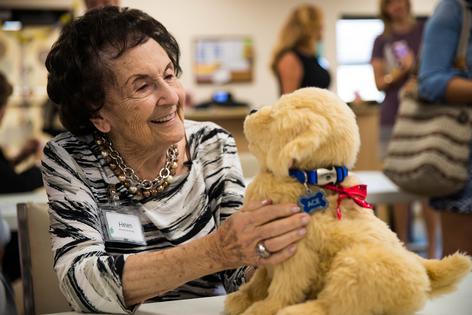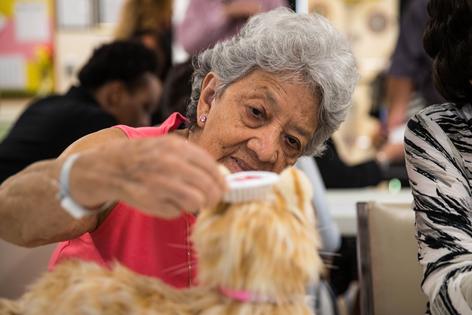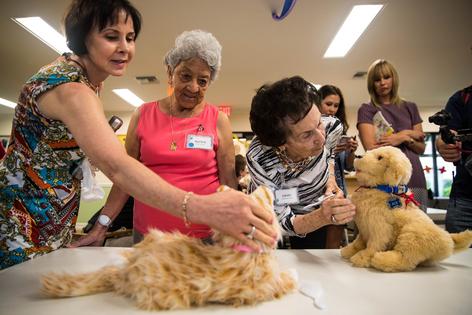Mechanical cats and dogs make great pets for dementia patients
Published in Senior Living Features
Helen is enamored with furry little Bonita, who purrs, meows and stretches out in Helen's arms.
"It's OK, it's OK," cooed the 84-year-old patient at the Alzheimer's Community Care organization's Specialized Adult Day Care Center in Boca Raton, as Bonita rolled on her back for a belly rub. "You're a pretty girl. Yes, you are. Are you going to be a good girl?"
Bonita isn't a real cat, and it's unclear whether Helen realizes it.
But if interacting with the robotic pet slows the advancement of Helen's mind-robbing Alzheimer's disease, it doesn't matter that the cat isn't real, the day care's operators say.
Recently, the center invited some of its donors and local media to witness a pair of robotic pets - Bonita the cat and a dog the residents named Ace - capturing the hearts and imaginations of the center's daily patients.
The robotic pets were among the first products in a line developed for the aging market by a division of toymaker Hasbro. Called Joy For All, the division was spun off by the products' developers in May into a standalone company that's looking at ways to integrate artificial intelligence into future robotic pets.
Although real live pets still visit the day care center on pet therapy days, the robotic stand-ins are safer to have around, said Karen Gilbert, vice president of education and quality assurance for Alzheimer's Community Care.
"They'll sit on your lap and respond to touch. The dog, we learned, even has a microphone and responds to voice commands," Gilbert said. "Our patients can hold onto them as long as they want. They won't jump off their laps. Live animals - you never know what they'll do."
In a clinical study involving 61 elderly adults with mild to moderate dementia, members of the group that regularly interacted with a robotic pet three times weekly for 20 minutes each session were found to have lower levels of stress and anxiety and depression, which allowed providers to decrease use of pain medication and psychoactive medication, compared with the group that received standard activity programs. The study, published in November 2016 by the Journal of Alzheimer's Disease, was funded by the Baylor Deerbrook Charitable Trust.
Use of the robotic pets is one of many ways that the Alzheimer's Community Care organization works to fulfill the intent of specialized adult day care centers, a type of center formally created in 2012 by Gov. Rick Scott and the state Legislature to help forestall nursing home placement for Alzheimer's patients.
Patients spend their days here but go home each night to their families or caregivers, said Jonathan Price, vice president, grants and fund development.
A robust schedule of activities during the day helps them remain relaxed during the at-home evening hours, when people with Alzheimer's tend to become agitated - a behavioral cycle known as "sundowning" - that can complicate family members' caregiving roles.
"One of the most effective ways to combat this is to have a patient have an active day," Price said.
Activities are rolled out one after another - word games, math games, arts and crafts, music and dancing - to keep brain synapses firing as much as possible, Gilbert said.
"The more creative we are with activities, the more we challenge that person to slow the progression of this disease," she said.
Facilities licensed under the 2012 Specialized Alzheimer's Services Adult Day Care Act are required to provide therapeutic activities for 70 percent of the day, Price said. Other requirements include a lower staff-to-patient ratio than standard adult day care centers, increased environmental safety measures to prevent patients from wandering off or harming themselves, and enhanced dementia-specific educational opportunities for caregivers and families.
The organization had heard about clinical successes from introducing robotic pets to Alzheimer's patients and purchased an initial pair of Joy For All pets for about $100 each with a grant from the Palm Beach County Partnership for Aging. After seeing its own residents' reactions, the organization asked its donor network to help locate money to buy more.
Nancy Schiller, owner of a Boca Raton gift store, In Good Taste, stepped up, donating $3,000 to buy a pair of the hypoallergenic robotic pets for each of Alzheimer's Community Care's 10 other specialized day care centers in Palm Beach, Martin and St. Lucie counties.
"It's a joy to give to this organization because you know exactly where your money is going," Schiller said.
Joy For All's cats come in three colors - orange tabby, silver with white mitts, and black and white tuxedo. The company's website says they "look, feel and sound like real cats," with sensors that respond to motion and touch, realistic fur and purring sounds and cat-like movements.
The team decided to develop a product for older adults after noticing they comprised 10 percent to 15 percent of the market for animatronic toys created for children, said Ted Fischer, CEO of Ageless Innovation, the company that spun off from Hasbro to expand the Joy For All line.
"We wanted to create affordable, realistic, interactive companionship (with a) play pattern that was recognized and understood," he said. "They give something and they get something - it's tactile."
But the brand's developers weren't trying to fool its elderly consumers into thinking the cats - or its robotic Golden Retriever pup - are the real thing, Fischer said.
"We were trying to replicate an experience for folks who were unable to enjoy a live pet," he said.
A big inspiration, and one of the products' early test subjects, was Fischer's grandmother, currently in her 90s and living in a Memory Care community - a specialized living environment for people with Alzheimer's and dementia. She was featured on the first product box, he said.
Before the spin-off, Joy For All teamed up with Brown University for a three-year project to develop a smart robotic companion capable of using artificial intelligence to assist older people with everyday tasks. The project is supported by a $1 million grant from the National Science Foundation, Fischer said.
Fischer envisions a pet capable of finding its owner's glasses and rules out possibilities suggested in the wide canon of science-fiction literature and film.
Consumers who want the current versions would be best served by going online, to Amazon.com or other websites, Fischer said. It's not a good fit for brick-and-mortar stores, he said.
"There's not really an aisle for a product like this because there's not a focus on the aspirational side of aging," he said. "There's not a lot of joy and happiness in that (aging products') aisle."
Visit the Sun Sentinel (Fort Lauderdale, Fla.) at www.sun-sentinel.com














Comments